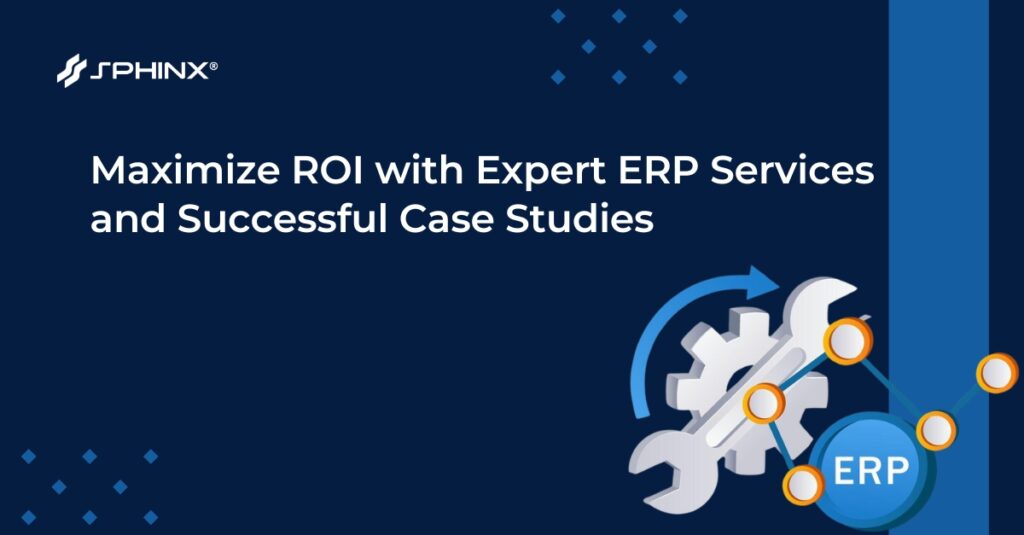In today’s competitive business environment, maximizing ROI is essential.
ERP (Enterprise Resource Planning) systems significantly contribute to this goal by streamlining operations and improving efficiency. This blog delves into the strategies for successful ERP implementation, common pitfalls to avoid, and showcases a case study highlighting the remarkable outcomes achieved with Sphinx ERP.
What is the ERP Implementation Strategy?
An ERP implementation strategy is a detailed plan outlining the steps and processes required to successfully integrate ERP software within an organization. This strategy is essential for ensuring a smooth transition and maximizing the benefits of the ERP system. Key components include project planning, software selection, data migration, system configuration, testing, training, and support.
Read more: 10 reasons why ERP is important for your business
Understanding ERP Implementation
Definition and importance
ERP implementation is the deployment of ERP software to unify and manage key business processes such as accounting, inventory management, human resources, customer relationship management (CRM), and project management. It involves several stages, including requirement analysis, planning, data migration, configuration, testing, training, and go-live support. The importance of ERP implementation lies in its ability to centralize data, automate processes, and provide real-time insights into the business.
ERP Implementation Strategy: Key elements
1. Project planning
- Initial assessment: Conduct a thorough assessment of current business processes and identify areas of improvement.
- Goal setting: Define clear objectives for the ERP implementation, such as increased efficiency, cost reduction, or improved data management.
- Timeline & milestones: Set a practical timeline and define specific milestones to monitor progress effectively.
2. Selection of ERP Software
- Vendor evaluation: Research and evaluate ERP vendors based on factors like functionality, scalability, and cost.
- Customization needs: Determine the level of customization required to meet unique business needs.
3. Data Migration
- Data assessment: Evaluate the quality and structure of existing data.
- Data cleaning: Remove duplicate, outdated, or irrelevant data to ensure accuracy.
- Migration plan: Develop a detailed plan for data migration, including mapping old data to the new ERP system.
4. System Configuration
- Module selection: Choose the ERP modules that align with business requirements.
- System integration: Ensure seamless integration with other business systems and applications.
5. Testing
- Functional testing: Test individual modules to ensure they perform as expected.
- User acceptance testing (UAT): Conduct testing with end-users to validate the system’s usability and functionality.
6. Training and Change Management
- User training: Provide comprehensive training sessions for all users to ensure they understand how to use the ERP system effectively.
- Change management: Create a change management plan to address resistance and ensure a smooth transition.
7. Go-Live and Support
- Go-live preparation: Ensure all systems are fully configured, tested, and ready for deployment.
- Post-go-live support: Provide ongoing support to address any issues and ensure smooth operation.
Common ERP Implementation Mistakes to Avoid
1. Lack of clear objectives
Without defined goals, the ERP implementation project can lose direction, leading to delays and increased costs. It is crucial to establish clear objectives from the outset.
2. Insufficient training
Users need comprehensive training to utilize the ERP effectively. Insufficient training can result in low adoption rates and operational inefficiencies.
3. Underestimating costs
Hidden costs can arise during the implementation process, such as for customization, training, and ongoing support. It is essential to budget accurately and anticipate potential additional expenses.
4. Inadequate project management
Poor project management can lead to missed deadlines, budget overruns, and project failure. Appointing a dedicated project manager can help ensure the project stays on track.
5. Neglecting data quality
Data quality is critical for the success of an ERP system. Inaccurate or incomplete data can lead to poor decision-making and operational inefficiencies.
6. Lack of top management support
The involvement and support of senior management are vital for the success of the ERP implementation. Their commitment can drive the project and ensure alignment with business objectives.
ERP System: Keys to Successful Implementation
1. Thorough planning
Detailed planning is essential for a successful ERP implementation. This includes defining objectives, establishing a timeline, and identifying key stakeholders.
2. Top management support
The involvement of senior management is crucial for driving the project and ensuring alignment with business goals. Their support can also help overcome resistance to change.
3. User training and support
Continuous training and support for users are essential to ensure they are comfortable with the new system and can utilize it effectively. This can improve adoption rates and operational efficiency.
4. Data quality management
Ensuring data accuracy and consistency is critical for the success of an ERP system. This involves cleaning and migrating data carefully and implementing data management best practices.
5. Effective project management
A dedicated project manager can help ensure the project stays on track, meets deadlines, and remains within budget. This includes regular progress reviews and risk management.
6. Customization and flexibility
Customizing the ERP system to meet specific business needs can enhance its effectiveness. However, it is important to balance customization with maintaining the system’s core functionality and scalability.
Read more: Benefits of Hiring an ERP Consultant
Case Study: Sphinx ERP Implementation
Client Overview
The client, a leading SME, faced challenges in integrating multiple business functions and improving operational efficiency. The goal was to implement a comprehensive ERP solution to streamline processes and enhance data visibility.
Challenges
- Disparate systems leading to inefficiencies and data silos.
- Manual processes causing delays and errors.
- Lack of real-time data visibility affecting decision-making.
Solution
Sphinx ERP was chosen for its modular and customizable approach. The implementation included modules for accounting, inventory management, human resources, customer relationship management (CRM), and project management.
Implementation Strategy
1. Initial Assessment
Conducted a thorough assessment of existing processes and identified areas for improvement. Defined clear objectives and established a detailed project plan.
2. Data Migration
Cleaned and migrated data from legacy systems to the new ERP system. Ensured data accuracy and consistency throughout the process.
3. System Configuration
Configured the ERP system to meet specific business needs. Integrated the system with other business applications to ensure seamless operation.
4. User Training and Support
Provided comprehensive training sessions for all users to ensure they understood how to use the new system effectively. Developed a change management plan to address resistance and ensure a smooth transition.
5. Go-Live and Support
Prepared for the go-live phase by ensuring all systems were fully configured and tested. Provided ongoing support to address any issues and ensure smooth operation.
Results
40% Increase in Operational Efficiency
Streamlined business processes reduced manual effort and errors, leading to a significant increase in operational efficiency.
30% Reduction in Operational Costs
Automation of processes led to significant cost savings, reducing operational costs by 30%.
Enhanced Data Visibility
Centralized data management improved decision-making capabilities by providing real-time insights into various aspects of the business.
The implementation of Sphinx ERP has led to a 40% increase in operational efficiency and a 30% reduction in operational costs for clients, achieved through streamlined processes and automation. Enhanced data visibility has significantly improved decision-making capabilities.
Our clients have expressed positive feedback, highlighting the system’s impact on their operations:
“Thanks to Sphinx ERP, our operations have become more efficient, and decision-making is now based on real-time data,”.
A project manager from a client company commented, “Sphinx ERP’s integration was seamless, and the support provided throughout the implementation process was exceptional. Our team quickly adapted to the new system, leading to a noticeable improvement in productivity.”
Contact Sphinx today for expert ERP consulting and implementation services. Our team is dedicated to helping you streamline your processes and maximize your ROI. With Sphinx ERP, you can transform your business operations, enhance efficiency, and make informed decisions based on accurate, real-time data. Let us help you achieve operational excellence and drive your business success.




CEO - Son Le
OTHER BLOGS
Blogs
AI Trends 2026: The Future of Enterprise Intelligence
Artificial Intelligence has moved beyond early adoption and isolated innovation. Today, AI is embedded across enterprise operations, from data analytics and customer engagement to risk management and decision support. However, as AI usage becomes widespread, many organizations are discovering that deploying AI alone does not automatically translate into strategic advantage....
Read MoreBlogs
IT Project Outsourcing for Enterprises: Strategic Best Practices
Enterprise organizations today are under constant pressure to innovate faster and modernize legacy systems, while also scaling technology capabilities without inflating operational costs. In this context, IT project outsourcing has evolved from a tactical cost-saving option into a strategic lever for long-term business growth. In this blog, we outline how...
Read MoreBlogs
Application Security 2026: Protect Your Apps from Key Risks
Application security has become essential in today’s digital landscape. Hackers often target web apps, APIs, and cloud platforms to access sensitive information. A security breach can not only compromise data but also interrupt business operations and harm your brand’s reputation. Without robust application security measures, companies risk expensive penalties, downtime,...
Read MoreOTHER BLOGS
Our Sevices
IoT Development
SphinX offers cutting-edge IoT development services, seamlessly connecting devices and providing innovative solutions for a...
Xem thêmOur Sevices
Blockchain Development
We are highly proficient in engineering reliable and secure blockchain technologies from the ground up,...
Xem thêmOur Sevices
ERP & CRM Development
ERP & CRM development services that you need! Streamline business processes and enhance organizational efficiency....
Xem thêmOTHER BLOGS
Our Sevices
IoT Development
SphinX offers cutting-edge IoT development services, seamlessly connecting devices and providing innovative solutions for a...
Xem thêmOur Sevices
Blockchain Development
We are highly proficient in engineering reliable and secure blockchain technologies from the ground up,...
Xem thêmOur Sevices
ERP & CRM Development
ERP & CRM development services that you need! Streamline business processes and enhance organizational efficiency....
Xem thêm